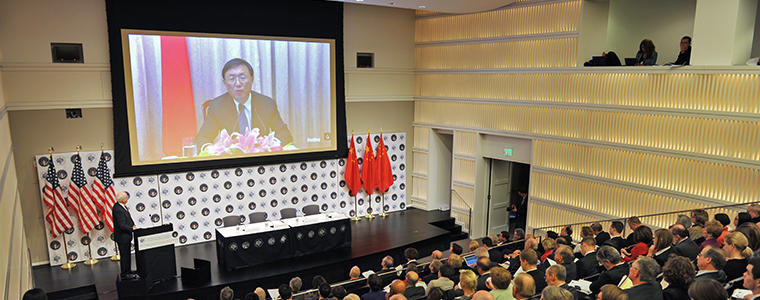U.S. – China: Looking Back, Looking Ahead at a Critical National Security Relationship
In a historic gathering of the leading officials who have built and managed the U.S.-China relationship, policymakers from both sides of the political aisle assembled at the U.S. Institute of Peace (USIP) on March 7 to assess the history, current state and future prospects for this critical relationship. The occasion was the 40th anniversary of President Nixon’s breakthrough trip to Beijing in February 1972.

Richard H. Solomon is President of the U.S. Institute of Peace.
 In a historic gathering of the leading officials who have built and managed the U.S.-China relationship, policymakers from both sides of the political aisle assembled at the U.S. Institute of Peace (USIP) on March 7 to assess the history, current state and future prospects for this critical relationship. The occasion was the 40th anniversary of President Nixon’s breakthrough trip to Beijing in February 1972.
In a historic gathering of the leading officials who have built and managed the U.S.-China relationship, policymakers from both sides of the political aisle assembled at the U.S. Institute of Peace (USIP) on March 7 to assess the history, current state and future prospects for this critical relationship. The occasion was the 40th anniversary of President Nixon’s breakthrough trip to Beijing in February 1972.
In a sweeping review of the history of the relationship –the architects of the opening to China—Henry Kissinger, Brent Scowcroft, and Zbigniew Brzezinski – met with other former officials and Chinese specialists and conducted a day-long assessment looking ahead at the political, economic, cultural and strategic issues that define the U.S.-China relationship. The day ended with Secretary of State Hillary Rodham Clinton delivering a powerful speech outlining the challenges to further developing a constructive partnership between the two nations. The event was co-hosted by USIP and the Nixon Foundation, with the support of the Kissinger Institute on China and the United States and the Woodrow Wilson International Center for Scholars.
The U.S.-China relationship, or in the Chinese vocabulary ‘the China-U.S. relationship’ has evolved over 40 years. The Chinese foreign minister, who provided the keynote address earlier in the day via a high definition video link, characterized the relationship as a ‘cooperative partnership’ with two countries respecting each other and treating each other as ‘equals,’ saying that China-U.S. relations have moved forward and that this can be a ‘win-win’ and ‘not a zero sum’ situation.
While many experts talked about the difficulties in dealing with China, Kissinger said that competition with a rising China is inevitable, but both countries have to avoid the temptation to see things in the short term as if “books are balanced at the end of every month.” Brzezinski echoed those thoughts in defining President Carter’s approach to building upon the Nixon breakthrough to strengthen cooperation with China.
Filling in historical blanks, Kissinger took the audiences behind the scenes of the Nixon trip with dramatic revelations about the secret talks that led up to the Nixon visit. Kissinger revealed that the White House at the time had considered a separate summit with the Russians prior to the Nixon trip to China, in order to head off a potential backlash from the Kremlin. In the end, that idea was abandoned and the Russian response to the Nixon trip had short-term benefits—opening the way for long-stalled agreements between Moscow and Washington including the Berlin Agreement and progress on avoiding an accidental nuclear war.
 Recognizing that a different China has emerged four decades after the historic Nixon trip, Kissinger talked about how a new generation has to re-adjust now to new political thinking in China. Later in the day the secretary of state echoed those sentiments with references to the many Americans in China who speak Chinese and the growing interest of Chinese in understanding America. Experts agreed that the issue of Taiwan’s future is far from resolved and can always pose tensions in the relationship, and that conflicting territorial claims in the South China Sea always risk controversy if not confrontation.
Recognizing that a different China has emerged four decades after the historic Nixon trip, Kissinger talked about how a new generation has to re-adjust now to new political thinking in China. Later in the day the secretary of state echoed those sentiments with references to the many Americans in China who speak Chinese and the growing interest of Chinese in understanding America. Experts agreed that the issue of Taiwan’s future is far from resolved and can always pose tensions in the relationship, and that conflicting territorial claims in the South China Sea always risk controversy if not confrontation.
Economists, former trade officials, and current Undersecretary of State Robert Hormats debated the economic challenges posed by a rapidly growing China, stressing the need to continue pressing China on issues like intellectual property rights protection and market access. Many experts warned that China’s economic development strategy, which currently stresses export-led growth managed by large state owned enterprises, will not be sustainable in the long-run. Thus, China’s future growth requires structural reforms that are likely to be resisted by entrenched interests.
The events of March 7th, 2012, and the cast of characters assembled reflect the enormous convening authority of the Institute and the ability to place historic issues in contemporary contexts in ways that help shape and define approach to global conflict and national security.
Explore Further
- U.S. - China Relations 40 Years After the Week That Changed the World
Q & A With Richard H. Solomon, President of USIP - The Week That Changed the World
Conference Resource page - Learn more about The Week That Changed the World conference
Event page | March 7, 2012



